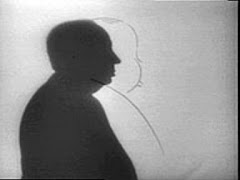My own book on contemporary global film directing practices and auteurism (Directing Cinema: The New Auteurism, for Manchester University Press) should come out next year. This project, which is obviously very closely connected in its topic to the Directing Cinema weblog, builds on my already published work on this topic over the last ten years, in particular my article for the millennial issue of the journal Screen (2000 41 (1). pp. 101-108), called 'www.auteur.com' (links to some online versions of this earlier work can be found HERE, HERE, HERE, HERE, and HERE).
Anyway, all of this is why I was probably more interested than many film researchers -- not to say more anxious than most! -- to hear of one new academic book, and one new, peer-reviewed article, which focus, respectively, on Western European and Spanish forms of auteurism. I look forward to reviewing both these items, on this blog and elsewhere, in due course, once I've studied them properly (Maule's book is hopefully on its way to me in the post), but they both look excellent, so I wanted to publish some information about them, and their authors' other related work, immediately.
The new book is called Beyond Auteurism: New Directions in Authorial Film Practices in France, Italy and Spain since the 1980s, and it is written by Rosanna Maule. Maule is the author of lots of very high-quality work on film authorship: amongst other books and articles, there's a very good essay of hers on the authorship of Germaine Dulac online at Senses of Cinema (link HERE); but she also published a 1998 article on the auteurism of Pedro Almodóvar (“De-authorizing the Auteur: Postmodern Politics of Interpellation in Contemporary European Cinema.” in Cristina Degli-Esposti, Ed. Postmodernism in the Cinema) which was very influential on my own thinking about auteurism (see 'www.auteur.com').
The publisher's blurb for Maule's new book reads as follows:
Beyond Auteurism is a comprehensive study of nine film authors from France, Italy and Spain who since the 1980s have blurred the boundaries between art-house and mainstream, and national and transnational film production. Maule examines how the individuals have maintained a dialectical relationship with the authorial tradition of the national cinema to which each belongs. In considering this tradition, Maule seeks to illustrate that the film author is not only the most important symbol of European cinema’s cultural tradition and commitment, but is also a crucial part of Europe’s efforts to develop its cinema within domestic and international film industries. The book studies the work, practices and styles of European film-makers including Luc Besson, Claire Denis, Gabriele Salvatores and Alejandro Amenábar. Beyond Auteurism offers an important contribution to a historicized and contextualized view of film authorship from a theoretical framework that rejects Western-centred and essentialist views of cinematic practices and contexts.
The new article on some aspects of Spanish auteurism is by Núria Triana-Toribio, author of the classic study Spanish National Cinema (Routledge, 2003). Triana-Toribio has also published other influential work on film authorship, including a co-authored article (written with Peter Buse and Andy Willis): on Spanish filmmaker Alex de la Iglesia 'The Spanish "popular auteur": Alex de la Iglesia as polemical tool', New Cinemas, 2: 3 (2004), pp.139-48., which was followed up by a co-authored book on that filmmaker. The article and the book helped to further establish in academic discourse the notion of 'popular auteurism' (following on from the foundational work on contemporary film auteurism by Timothy Corrigan, which began with his 1990 essay 'The Commerce of Auteurism' [JSTOR link HERE]), and usefully focused study on the seeming migration of previously 'highbrow' and 'middlebrow' artistic concepts into areas of popular cultural commerce.
Triana-Toribio also wrote one of the best studies of Pedro Almodóvar that I have had the pleasure to read: her 1994 PhD thesis, 'Subculture and popular culture in the films of Pedro Almodovar', a section of which is available in a pamphlet version, in addition to two article versions (1996: 'Almodóvar's Melodramatic Mise-en-Scène: Madrid as a Site for Melodrama', Bulletin of Hispanic Studies, Vol.73, 179 - 189; and also 1996: 'Pedro Almodóvar's Recreation of Melodrama', Journal of Iberian Studies, Vol.9, 46 - 54).
Triana-Toribio's new article on auteurism appears in the new issue of Screen (2008 49: pp. 259-276). It is entitled 'Auteurism and commerce in contemporary Spanish cinema: directores mediáticos' (restricted Screen Online link HERE). Here's the abstract:
This article studies the evolution of auteurism and commerce in Spain using technologies such as the Internet. Spanish directors are becoming mediáticos (media friendly and using media as marketing tools) in response to the new conditions in which the national cinema is immersed among them the saturation in European screens and the ever-present competition with Hollywood. Those directors who can claim the status of auteur do so as part of their commercial strategies. In this analysis of the present-day conditions in the commerce of Spanish cinema, the focus is on two case studies of media-friendly and established auteurs, Isabel Coixet and Álex de la Iglesia who have and manage homepages where information about their work, their careers and other aspects of their authorial personas. Both auteurs can be considered to be at opposite ends of the spectrum genre cinema/art cinema within the Spanish cinema traditions. The questions that inspire this exploration deal with the functions of these homepages and what they can tell us about the present and future of film commerce and auteurism in Spain.So, lots of reading to do of Maule and Triana-Toribio's studies of aspects of 'new auteurism'. I'll post again on what I find.







No comments:
Post a Comment